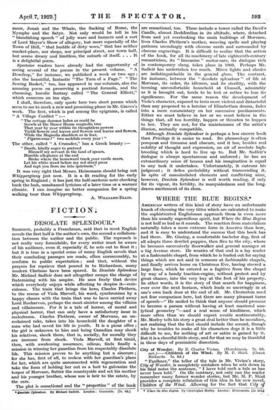WHERE THE BLITE BEGINS.*
AMERICAN writers of this kind of story have an unfortunate knack of choosing the very titles which are calculated to make the sophisticated Englishman approach then) in even more
than his usually supercilious spirit, but Where the Blue Begins is not half as bad as it sounds. The reaction from materialism naturally takes a more extreme form in America than here, and it is easy to understand the success that this book has had there. Mr. Gissing, a comfortable bachelor dog, first of all adopts three derelict puppies, then flies to the city, where he becomes successively floorwalker and general manager at a big Avenue store. He wearies of that and is a lay reader at a fashionable chapel, from which he is hurled out for saying things which are not said in sermons at fashionable chapels, and finally arrives home on Christmas Eve, having steered a large liner, which he entered as a fugitive from the chapel by way of a handy traction-engine, without protest and by great chance, into the very bay at the foot of his property.
In other words, it is the story of that search for happiness, ever over the next horizon, which leads so unerringly in at one's own back door at the end of all. Mr. Chesterton need not fear comparison here, but there are many pleasant turns of speech—" He smiled to think that anyone should presume to become a parson without having at least mastered ana-
lytical geometry "—and a real sense of kindliness, which more often than we should expect avoids sentimentality. Mr. Morley tells his story a great deal better than he moralizes, not realizing that the first should include the second, though why he troubles to make all his characters dogs it is a little difficult to sec, for nothing of art or satire is gained by it. But it is a cheerful little story, and for that we may be thankful
in these days of pessimistic dissection.










































 Previous page
Previous page